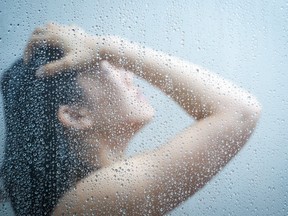What we know about aquagenic urticaria, or water allergy

For those who suffer from aquagenic urticaria, or water allergy, the simple act of washing your hands, or taking a shower, or sweating — even crying — can lead to a breakout of burning, itchy hives.
Loren Montefusco, 22, has spent the better part of the last decade dealing with the condition, leading to her abstaining from showering to avoid the itchiness and burning that follows water exposure.
Montefusco, who is from South Carolina, added that she will “claw” at her own skin to feel pain rather than the irritation of the itching.
She said she avoids bathing as much as possible, opting instead for body wipes and dry shampoo. She has found a small community online of other individuals who suffer from the condition, which she said made her feel a lot “less gross.”
“It has helped me to find other sufferers and see that others have the same struggles as me because it makes me feel less disgusting about the fact that I have to refuse to shower,” she said.
Here’s what’s known about the exceedingly rare condition.
What causes aquagenic urticaria?
The first documented case of aquagenic urticaria dates back to the late 20th century and it’s estimated that there are fewer than 100 cases of the condition globally.
It’s believed that the allergy originates from an unusual immune reaction prompted by the contact of water with the skin. Water sets off the body’s defence mechanisms, leading to the release of histamine and the accompanying hives, welts and itching.
What are the treatment options?
Treatment options for water allergy focus mainly on managing symptoms, as there is no known cure.
Antihistamines can help reduce itching, swelling and hives, while corticosteroids, in more severe cases, can be prescribed to reduce inflammation.
Ultraviolet light therapy, or phototherapy, can also help reduce the immune response and inflammation. The effectiveness of phototherapy is believed to be related to the thickening of the epidermis, which reduces the skin’s permeability to water.
What about hydration?
While aquagenic urticaria usually manifests as an external skin reaction, allowing affected individuals to consume water without experiencing internal symptoms, there are exceptions.
Tessa Hansen-Smith, 27, started to develop a water allergy at 8-years-old and its severity has increased as she’s aged.
She documents her experiences on Instagram, using the handle “living waterless” and says she has a form of aquagenic urticaria that is both internal and external.
“There is no cure, there’s just management and medication, and also restriction and avoidance,” she says of the allergy.
Hansen-Smith also notes how psychological support can also play a role in treatment, allowing people to navigate the emotional difficulties associated with living with a chronic and misunderstood condition like water allergy.
Our website is the place for the latest breaking news, exclusive scoops, longreads and provocative commentary. Please bookmark nationalpost.com and sign up for our newsletters here.